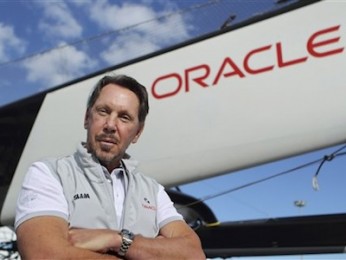 GenAI fuelled Oracle’s infrastructure revenue in its most recent quarter, and more profit is likely.
GenAI fuelled Oracle’s infrastructure revenue in its most recent quarter, and more profit is likely.
Oracle co-founder Larry Ellison told listeners on the company’s quarterly earnings call that Oracle was bringing GenAI to a wide range of industries – highlighting a digital assistant for ambulatory clinic systems and the technology’s work in aligning Albania’s laws with the European Union’s to speed up the country’s EU entrance.
“Oracle’s Gen 2 AI infrastructure business is booming. That’s become pretty clear to everybody,” he said,
When asked by an analyst about the “herculean increase in new business” needed to grow Oracle’s infrastructure-as-a-service (IaaS) revenue by 49 per cent year over year, Oracle CEO Safra Catz credited growth with existing and new customers.
“Many, many customers have come on but haven’t gotten capacity yet. We’ve got at least 40 new AI bookings worth over a billion dollars that haven’t come online yet.”
Ellison credited Oracle’s ability to build cloud data centres of various sizes, sharing that the vendor is at work on one in the U.S. “where you can park eight Boeing 747s nose to tail in that one data centre.”
The executives stressed Oracle’s work meeting demands, with Microsoft already adding three more data centres to the 20 Oracle was already building.
“We’re bringing on enormous amounts of capacity over the next 24 months,” Ellison said.
“The demand is so high. We need to do that to satisfy our existing set of customers…We’re seeing demand for data centres from people who want to buy Alloy and then resell our cloud services with their proprietary cloud services on top of it.”
Ellison predicted on the call that Oracle “will end up with more data centres and cloud regions than all the other hyperscalers combined.”
Oracle has 13 live dedicated and Alloy regions, 18 under construction and five new ones signed during the quarter.
“Microsoft does not compete for this business,” he said.
“AWS and Google do not compete for this business. We’re the only ones in it.”
Catz said that Oracle’s fiscal year 2025 should include £8 billion in capital expenditures.
“It also involves not only some big centres but also the expansion of existing centres—so we’ve already got some areas that we’ll be filling out,” she said.
When asked if Oracle will encounter the graphics processing unit (GPU) constraints plaguing other technology companies, both Catz and Ellison said the vendor is good to go and that electric power and communication connections are the bigger constraints.
Ellison said that Oracle’s partnership with Nvidia has helped and pointed to the vendor’s ongoing collaboration with Microsoft as a way to grow use of Oracle offerings in the cloud and migrate customers to Oracle’s Autonomous Database, predicting further customer adoption of multi-cloud environments.
“We’ve been the No. One database in the IT ecosystem for a very long time – we think that’s going to preserve that franchise and expand it,” he said.
Oracle reported £10.7 billion in total revenue for the quarter, up seven per cent year-over-year.
Cloud services and license support revenues were £8bn, up 11 per cent year-over-year, ignoring foreign exchange.
Cloud license and on-premises license revenues were £1 billion, down three per cent year-over-year.
The vendor’s total remaining performance obligations (RPO) was a record £64 billion, up 29 per cent. Oracle should recognise 43 per cent of that money as revenue over the next four quarters.
Operating income using generally accepted accounting principles (GAAP) was £3bn. Net income was £1.9 billion.
Total cloud revenue for the quarter was £4.1 billion, which is up 24 per cent year over year, ignoring the foreign exchange.
Oracle generated £1.4 billion in infrastructure-as-a-service (IaaS) revenue, an increase of 49 percent year over year. Cloud application revenue was £2.6 billion, up 14 percent year over year.
Fusion Cloud ERP and NetSuiteCloud ERP each brought in £64 million for the quarter. That is an 18 per cent increase year-over-year for Fusion and a 20 per cent increase for NetSuite, ignoring foreign exchange.
Oracle traded at about £104 a share after hours, up about 14 per cent.
For fourth fiscal quarter guidance, Catz said she expects total revenue, excluding Cerner, to grow six to eight per cent year-over-year.
Total cloud revenue, excluding Cerner, should grow from 22 to 24 per cent.





